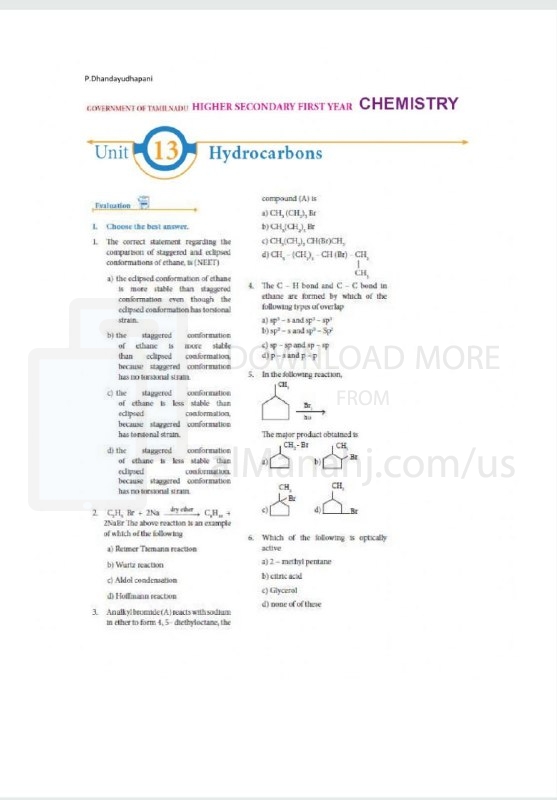| You are here: Almanahj Website ⇒ American curriculum ⇒ 12th Grade ⇒ Chemistry ⇒ Term 1 | ||
|---|---|---|
Worksheet about Hydrocarbons | ||
|---|---|---|
| Subject: Chemistry | ||
| 12th Grade | ||
| Term 1 | ||
| Year: 2023/2024 | ||
| Size: 498.5KB | ||
| Number of clicks: 119 | ||
| Publish date:November 05, 2023 | ||
| Added by: Eman | ||
| Last download date: 2024-09-12 13:12:21 | By: theodor P.Dhandayudhapani | |
| File info: Hydrocarbons are organic compounds composed solely of hydrogen (H) and carbon (C) atoms. They are fundamental to the field of chemistry and play a significant role in various aspects of our daily lives. Here's a description of hydrocarbons in chemistry: 1. Composition and Structure: - Hydrocarbons consist of carbon and hydrogen atoms, with carbon forming the backbone of the molecule. - The arrangement of carbon atoms in a hydrocarbon can vary, giving rise to different types of hydrocarbons with distinct properties. - Hydrocarbons can be classified into two main groups: saturated hydrocarbons (alkanes) and unsaturated hydrocarbons (alkenes, alkynes, and aromatic hydrocarbons). 2. Saturated Hydrocarbons (Alkanes): - Alkanes are hydrocarbons that have single bonds between carbon atoms and are saturated with hydrogen atoms. - They have a general formula of CnH2n+2, where n represents the number of carbon atoms. - Alkanes are relatively unreactive compared to other hydrocarbons and are commonly found in fossil fuels such as natural gas, petroleum, and coal. 3. Unsaturated Hydrocarbons: - Unsaturated hydrocarbons contain one or more double (alkenes), triple (alkynes), or aromatic (benzene ring) bonds between carbon atoms. - Alkenes have the general formula CnH2n and contain at least one carbon-carbon double bond. - Alkynes have the general formula CnH2n-2 and contain at least one carbon-carbon triple bond. - Aromatic hydrocarbons, such as benzene, have a unique ring structure and exhibit special properties and reactivity. 4. Properties and Applications: - Hydrocarbons are generally nonpolar compounds with low boiling points and are insoluble in water. - They are known for their flammability and are commonly used as fuels for heating, transportation, and energy production. - Hydrocarbons serve as raw materials for the production of various chemicals, polymers, plastics, solvents, and pharmaceuticals. - They are also essential in the manufacturing of lubricants, waxes, detergents, and many other industrial and consumer products. 5. Environmental and Health Considerations: - Hydrocarbons, particularly those derived from fossil fuels, can contribute to air pollution and the generation of greenhouse gases. - Some hydrocarbons, such as polycyclic aromatic hydrocarbons (PAHs), are considered environmental pollutants and potentially harmful to human health. - However, advancements in technology and the development of cleaner and more sustainable hydrocarbon sources are being pursued to mitigate these concerns. Hydrocarbons are a fundamental class of compounds in chemistry that serve as the backbone of organic chemistry and have numerous practical applications. Understanding their properties, reactions, and the diverse range of hydrocarbon compounds is essential for various fields, including energy, materials science, environmental science, and pharmaceuticals. | ||
| Downloading link Worksheet about Hydrocarbons |
|---|
|
1699166159.pdf
The file is being prepared for download
|
| File images |
|---|
 |